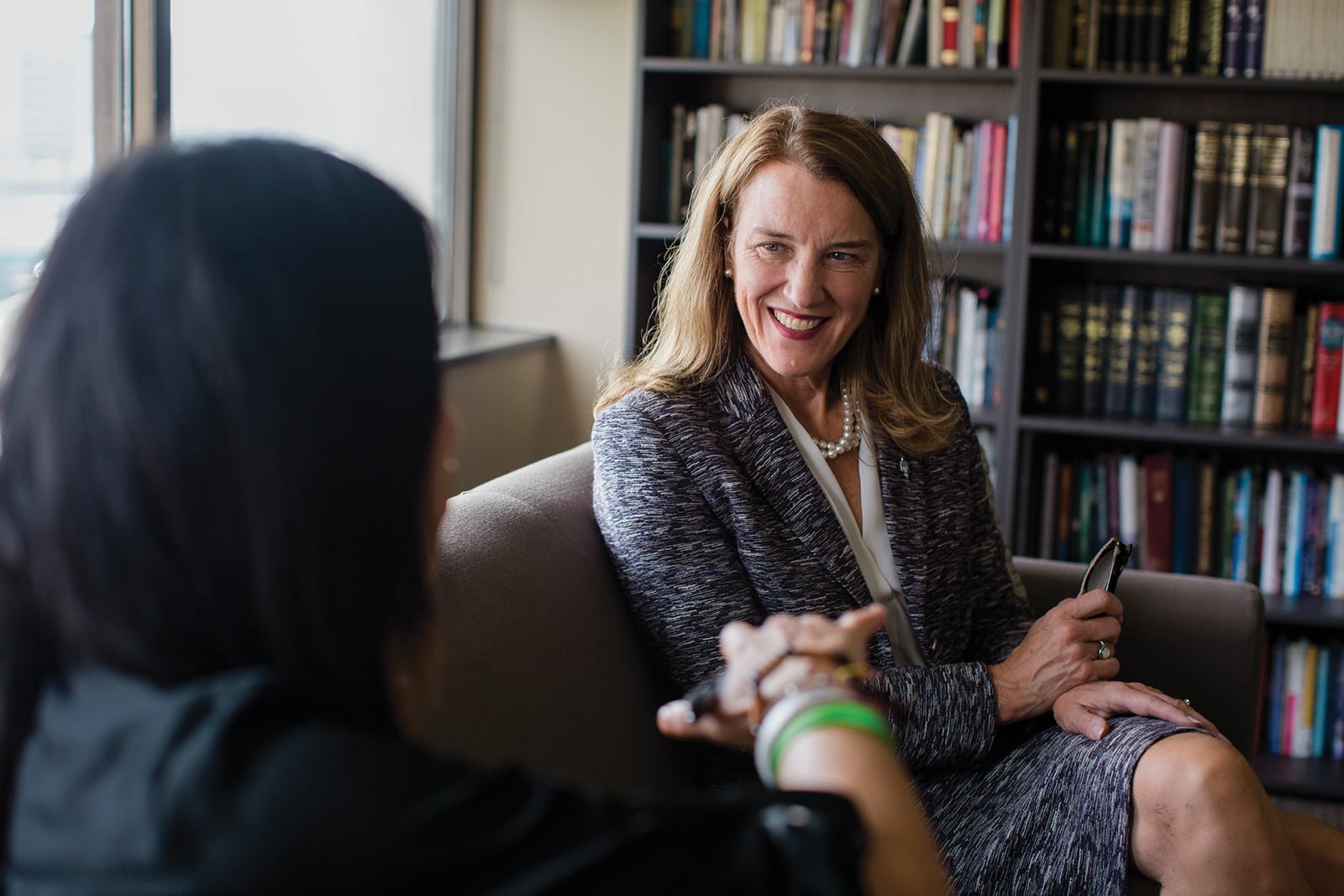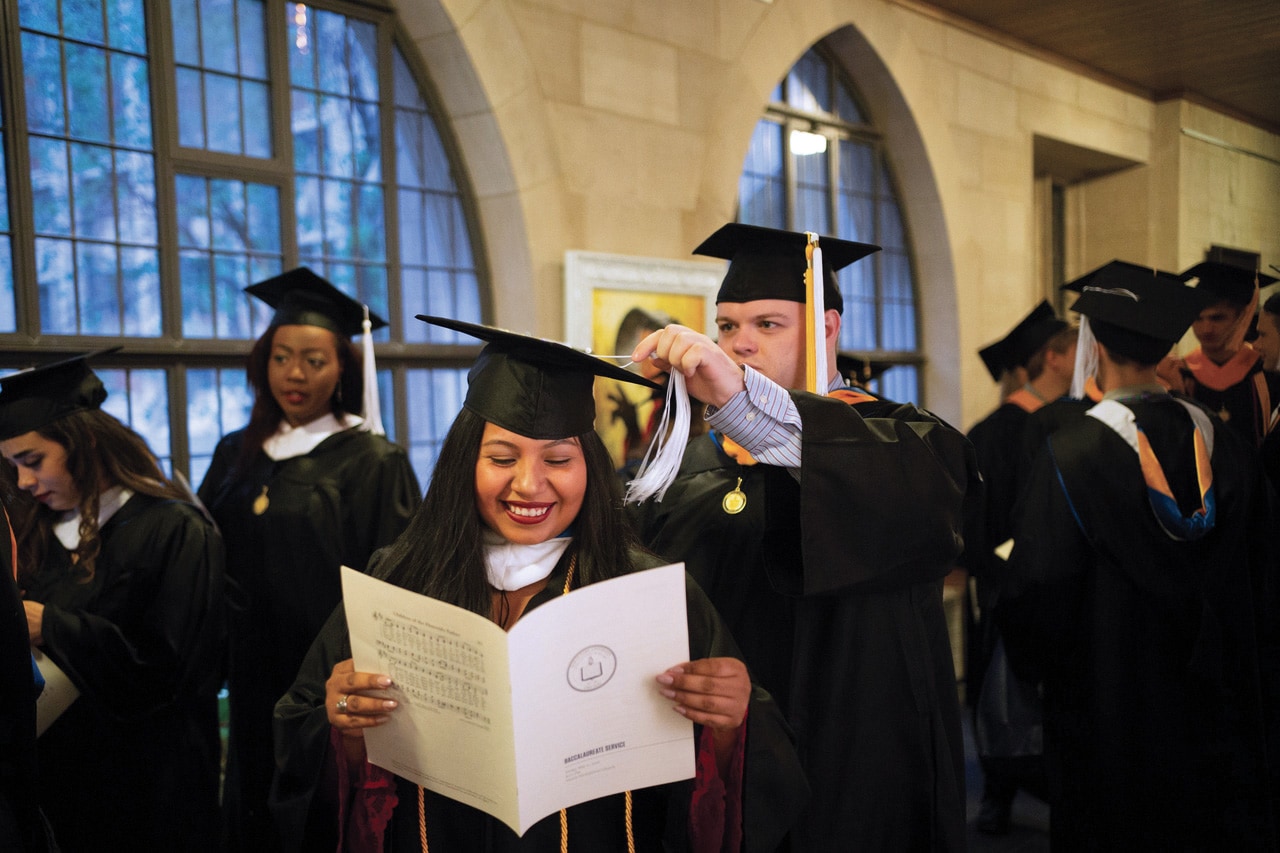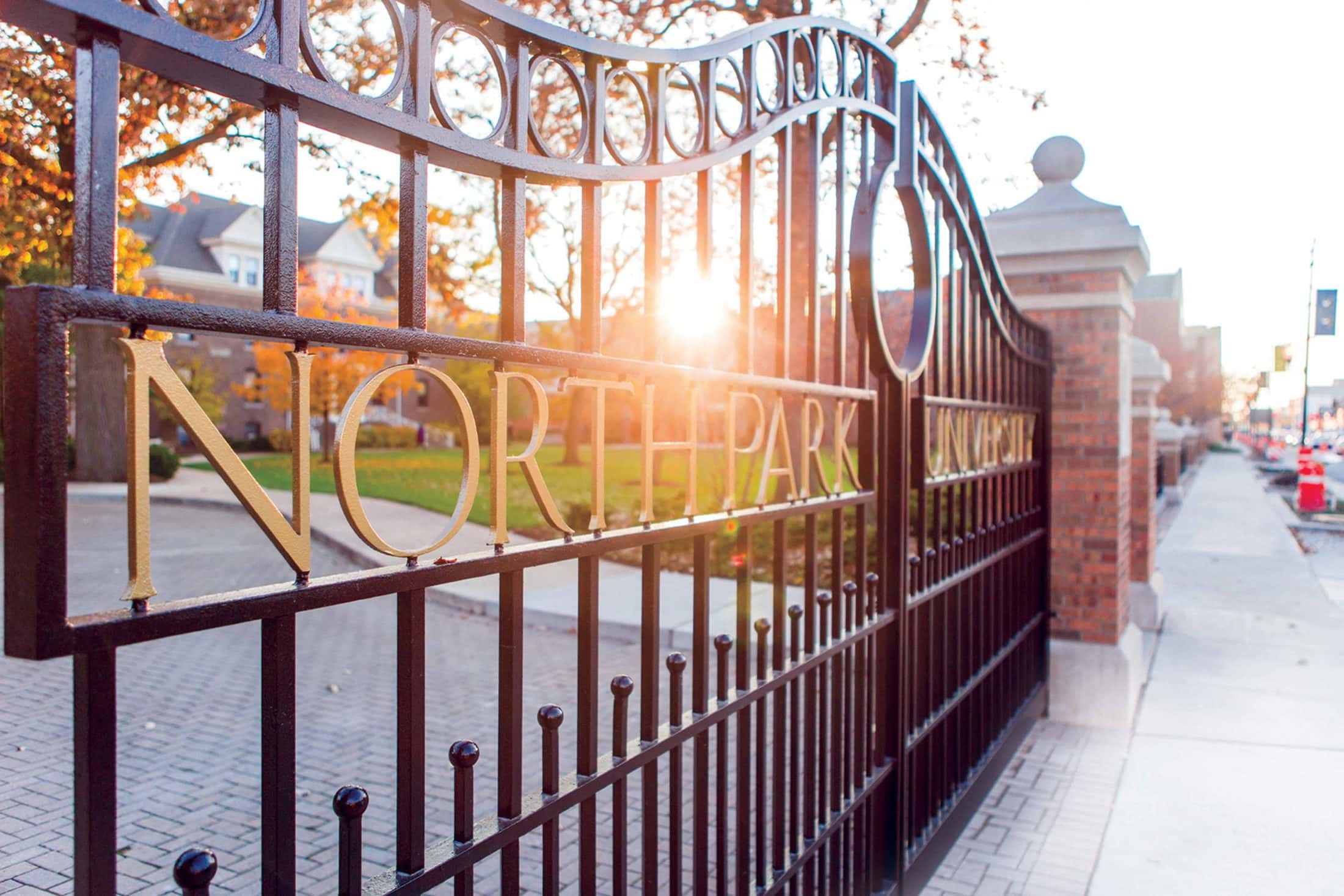The North Park Distinctive
An Interview with Mary Surridge
by Erin Chan Ding | November 18, 2019
At her inauguration less than one year ago, Mary Surridge, the 10th president of North Park University, referenced the nine men who had served in the role before her, noting that leadership at the college had moved from “bow ties to neckties to pearls.”
“It’s a stark change,” Surridge said, “and I am honored to be the first female.”
In a recent conversation, Surridge reflected on her first year as president; the challenges of Christian higher education; the university’s burgeoning demographic diversity; and the responsibility that comes with being a “first.”
“I hope that I will be as strong a caretaker of the mission of the university as all of those who had gone before me,” she says. “And if so, the university succeeds.”
Looking back at this past year, what has surprised you the most?
I previously served in development, student affairs, recruitment, retention, and in coaching—and I call on every one of those experiences every day now. I also know that no matter how long you’ve been at the institution, there is a high learning curve when you step into a new position. You have a new level of responsibility. It’s not a 24/7 job, but it is 365, because it’s never out of your mind. So even though you understand the culture of the university, and you understand the legacy, there’s a lot to learn. But I have strong colleagues, and they help me a great deal.
Can you tell us about that transition to this role?
A large part of my role in the past was supporting the president for success, and that meant the success of the institution. I also had peers in the other vice-presidents. Now I look to the vice-presidents for that kind of support—and I know I have a responsibility to support all the other leaders at the university. That means learning the academic structure and the value of shared governance. I’ve always had a great deal of respect for our faculty and the way they serve, teach, and support our students. Now I am working to understand their needs from a presidential level, and that’s a new experience for me.
What does it mean to you to be the first woman serving in this position?
Any time you’re the first, you’re setting a path. I knew it was important right away to set some priorities and communicate them clearly—and they weren’t priorities for me as a woman. They certainly are priorities I align with, but they were the right priorities for North Park in that first year.

What were the priorities?
Number one is respect—respect for the mission, for the legacy of our school, and for the Board of Trustees and their ultimate responsibility for the future of the university.
Second is resource generation. The resource generation and management of our financial budgets is critical. Small, private, liberal arts institutions are almost entirely tuition-dependent. At North Park, 88 percent of our operating budget comes from tuition revenue at this point. We want to support our students and see them reach their goals and achieve their degree. So that means being able to recruit our students well, retain them well, and it means inviting our generous alumni and friends to come alongside us and provide some of the resources that support scholarships. We need to keep a North Park education affordable, and that requires considerable institutional aid. Higher education is under pressure like never before. We must be creative in generating new revenue streams.
We also have to steward our funds very well. Sometimes that means constrained budgets, so we have to do as much as we can to work efficiently and effectively.
Third is responsibilities and results. We set goals, work toward goals, achieve goals, exceed goals, and set new goals. Everybody’s work can be measured on one level or another. One of our trustees says to me, “If you can’t measure it, you can’t manage it.” So we ask, what’s our goal for recruitment? What’s our goal for retention? What’s our goal for placement of our students within six months after graduation? What’s our goal for Covenant recruitment? What’s our goal for diversity on campus? What’s our goal for internships and opportunities for our students?
One measure we’re very proud of is that 98 percent of our students receive institutional tuition support from North Park in scholarship form. That is due to the generosity of our devoted alumni and friends.
And finally, the fourth is relationships. We prioritize relationships with our faculty, our students, the denomination, our alumni, and our friends, all of which need investment. It’s an opportunity to build these relationships.
 The landscape of higher education is shifting as costs skyrocket and the pool of potential students decreases. How are you positioning North Park for success in this challenging marketplace?
The landscape of higher education is shifting as costs skyrocket and the pool of potential students decreases. How are you positioning North Park for success in this challenging marketplace?
I deeply believe North Park can emerge as a national model for Christian higher education in this century because of three distinctives that set us apart.
First, we are a distinctively Christian university. We know who we are. That is our identity and our mission. Second, we are a city-centered university. We want to prepare students for lives of significance and lives of service—to find their calling and be equipped to serve the needs of the city across every profession. Finally, our intercultural student population is a rich tapestry of who we are. No single population makes up a majority of our student body. Nearly half our students identify as people of color. In our Christian identity, we recognize that diversity is our mission, our heritage, and our future. So it is in the sum of our three institutional distinctives, that we find our unique value and our competitive advantage.
How does that diversity of thought and culture enrich the life of the university?
First of all, the community on campus is so rich because the classroom brings together the ethnic, socioeconomic, and academic backgrounds of a wide range of students. They learn to work with and for each other. The first day of the fall semester, I told students, don’t be afraid to ask for a tutor when you need help, and don’t be afraid to volunteer as a tutor in a class where you’re strong.
When we ask employers what kind of graduate they are looking for and how we should be preparing our students for careers in their corporations and nonprofits, they tell us, “We’re looking for students who are academically prepared and morally and ethically able to perform in groups of students and workers who are unlike themselves. We’re looking for people who can think creatively and critically and work collaboratively within a diverse group of people.”
When they say that, they’re describing the North Park graduate.
How do you see the landscape for colleges and universities changing?
We are entering a time when the college-age demographic is in significant decline, so we not only have to work harder at recruitment—we have to work smarter. We have to make sure we right-size our operations to make North Park the strongest it can possibly be. Many of the historical habits in higher education are not sustainable now, because we just don’t have the structure for growing enrollment that we’ve had in the past. Now there are fewer and fewer 18-year-olds in the United States. So we have to reach beyond traditional-aged college students in our recruiting, explore new educational platforms, and examine our business practices and all of our systems in delivering the student experience.
We’re delighted to be in the city —Chicago is our classroom and it’s also a recruiting ground for us. Kids are staying closer to home for college too, so we have to be extremely prolific and effective in our recruitment within our 50-mile radius.
In addition, small private liberal arts institutions are fragilely balanced, so we have to pay attention to everything. We have a beautiful park-like campus, but as with many of our peer institutions, we have some aging buildings, so there are deferred maintenance issues.
We also want to make sure we can financially support those students who don’t have access to us because of the high cost of small, private, liberal arts education. I’m devoted to creating financial access for students who can academically thrive at North Park but may not have the financial resources to be there.
Traditional residential private liberal arts education is still an excellent choice, but there is a greater range of choices now. We need to recognize who our competitors are. It’s not just private colleges. Now it’s corporations who are deciding they’re going to educate people with what they need to know within their company. It’s online learning. We have to make sure we deliver our student experience very well so that people do choose us—because there are fewer students, and the competition for them is stiff.
What does it mean for North Park to be part of the Covenant Church?
The university was founded by Swedish immigrants to educate the next generation in theology, commerce, and the liberal arts. Their goal was
to propel the next generation forward in order to extend the mission and their professions. That’s what we do today. The fact that we have this rich history is a strength, but it’s also a strategic opportunity. I always say the Covenant Church does the bookends of life very well. We do Christian education, Sunday school, junior and senior high, youth ministry, camp, and CHIC really well. And we do retirement in Covenant Living Communities well.
Those of us who stand in the middle serve in both directions. It’s our responsibility to extend that Christian identity into the college setting. I want every Covenant student to have North Park in their top choices for college. I want them all to make a campus visit. I firmly believe that when you make a campus visit, North Park is going to be number one. We have a beautiful setting in a world-class city with unlimited opportunities, and we support our Covenant students with significant financial aid. We doubled Covenant enrollment in the incoming class this year over last year. And we know from experience that Covenant students will love it here and do well here.

What’s the challenge of being a distinctively Christian college in an age when many young adults are distancing themselves from a specific faith institution?
Our students choose North Park for a variety of reasons. Certainly, to get a meaningful degree that will help them build a professional life. But one of our unique opportunities is to introduce them to a life of personal faith. This is an environment where community and fellowship and testing faith are all open to them. The academy is the home for research and dialogue as well as testing lots of different theories and lots of different beliefs. By definition, it’s a place of learning.
On campus we are not their home of origin, and we’re not their destination—we’re a bridge to introduce intellectual thought, spiritual discovery, and a commitment and devotion to a life of faith in God and a daily walk with Jesus in an environment where they can receive guidance and support.
Four verses are inscribed on the wall at the center of campus. One says, “In thy light we shall see light” —the motto of North Park. God’s light shines on the things that we know and learn and discover. It’s a wonderful place for challenge, for opportunity, for growth, for trust, for commitment. It’s unlike almost any other environment we encounter in life.
It’s the beginning of your second academic year. Have your priorities shifted at all?
Some people say North Park is the best-kept secret in Chicago. We’re looking to remove that moniker, and that means we have to raise our visibility. I’m trying to say yes to every opportunity that will help us tell our story.
We also need to examine our academic programs and our financial model. Higher education is under siege because of population decline and because of the constant questioning of the value of a degree. We have to do a better job of telling our story, and we have to make sure we are excellent in what we do and be extremely assertive in our pursuit of students on all ranges.
We also have to make sure we are flexible in the marketplace to adapt to what is being called for, and be strategic in the programs that we offer to make sure that they are market-sensitive, mission-consistent, and provide the financial margin that we need to succeed.
What are your dreams for North Park, both in the short-term and in the long-term?
We must stay true to mission and position ourselves for financial sustainability. It is our Christian imperative to prepare an intercultural student body for a diverse and changing world. We must prepare the next leaders for the challenges of that world.
I think it’s the sum of our three distinctives—Christian, city-centered, and diverse—that provides the competitive advantage that’s going to help us emerge as a model for Christian higher education in 21st century America. We’re going to do everything we can to strengthen North Park, to provide for our students, and secure our mission into the future.














